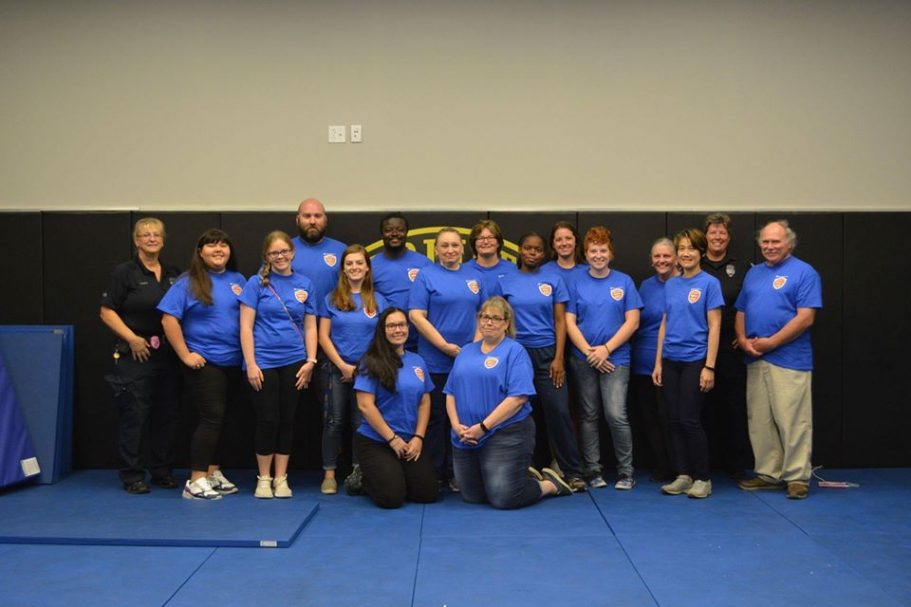- Homepage
- Community Programs
- Videos
- Vulnerable Persons Reporting
Vulnerable Persons Reporting
This training video is designed to provide members of the University of Florida community with the information necessary to ensure compliance with Florida State Statutes (FSS) 39.201 (1), 39.205 (1), 39.205 (3), and 39.205 (4) as well as Board of Governors Regulation 3.002.
These regulations specifically outline the duties of those who become aware of any potential situations that involve the abuse, abandonment, and/or neglect of a child. Please take the time to view this video and note the responsibilities we all share in ensuring that we protect those who are most vulnerable.
Text Transcript Below
This training was prepared by the State University System of Florida Board of Governors to provide an overview of the changes to Florida’s child abuse reporting laws. We’d like to thank Mr. Stephen Pennypacker, Deputy Director, Children’s Legal Services, for the Department of Children and Families for providing assistance and material for the development of this training.
In addition to covering the changes to Florida’s child abuse reporting laws, this training will cover Board of Governors Regulation 3.002. Regulation 3.002 was developed in response to new reporting requirements for institutions of higher education and the Board of Governors’ responsibility to assess penalties for any state university that fails to report child abuse, abandonment or neglect.
Prior to the changes in the Vulnerable Person’s Act going into effect on October 1st, 2012, every person within the State of Florida had the requirement to report suspected child abuse, abandonment or neglect by a caregiver to the Department of Children and Families (DCF). If the abuse was not by a caregiver, DCF would instruct you to contact your local police department to report the crime. The changes to the law now require all persons to report any incident of suspected child abuse, abandonment or neglect regardless of whether the perpetrator is the child’s caregiver.
You have always had the requirement to report caregiver abuse in the state of Florida. What is changed is that you are now required to report all known or suspected abuse to DCF. A person who is required to report known or suspected child abuse, abandonment or neglect and who knowingly and willfully fails to do so, or who knowingly and willfully prevents another person from doing so commits a felony in the third degree punishable by up to five years in prison and a $5,000 fine. Reports of known or suspected abuse must be made immediately to DCF’s central abuse hotline.
There are currently four ways to make a report: by telephone using the state’s toll-free number, by fax, via the web, or for those individuals who are hearing impaired, through the telecommunications device for the deaf or TDD line. The immediacy requirement is triggered when you have sufficient information to suspect that child abuse, abandonment or neglect is occurring. However, if a child is in imminent danger, dial 911 first and then immediately report the abuse to DCF.
In response to the expansion of reporting requirements, the law requires DCF to develop and provide web-chat and other web-based formats for reporting. DCF’s central abuse hotline will immediately transfer reports of child abuse, abandonment or neglect by a non-caregiver to the appropriate county sheriff’s office. In response to incidents involving child abuse that occurred at Penn State and the failure of individuals at Penn State to appropriately report the abuse, public or private universities and colleges in the state of Florida may now be fined $1 million per occurrence if an administrator knowingly or willfully fails to report or prevents another person from reporting a child abuse, neglect, or abandonment.
The requirement to report includes incidents that occur on campus, but also extend to incidents that occur at university-sponsored events, which may occur off-campus. In addition to the administrators failure to report causing a penalty for a university administrators’ failure to report is also considered a third degree felony punishable by up to five years in prison and a fine of $5,000 under Florida’s mandatory reporting requirements. In addition to the potential for penalties, if the administrator fails to report or prevents the reporting of child abuse, abandonment or neglect, the university’s law enforcement agency that fails to report known or suspected abuse, abandonment or neglect committed on university property or at university-sponsored event, will also subject the university to a penalty of $1 million for each failure. The Board of Governors is responsible for determining if there has been a violation of the statute and may assess a fine.
The procedures for making the determination are detailed in the Board of Governors Regulation 3.002, which we will cover shortly. A university has the right under Section 39.205 to challenge the Board’s determination in an administrative hearing. It is important to remember, however, that if found that the institution’s administrator or law enforcement had knowledge of the known or suspected abuse under the law, a presumption of a knowing and willful act is established. This places the burden on the institution to prove that the administrators or the law enforcement agency did not have knowledge of the alleged, known or suspected abuse, abandonment or neglect. Board of Governors Regulation 3.002 was developed to further clarify the penalties associated with the university’s willful and knowing failure to report child abuse, abandonment or neglect. The regulation contains two critical definitions: administrator and law enforcement.
In addition, the regulation lists the penalties that may be assessed against the university for failure to report abuse, and the procedures the Board of Governors will use to investigate an allegation of the university’s failure to report. The regulation also clarifies the university’s ability to challenge the determination by the Board of Governors. The Board of Governors regulation defense an administrator to include specific high level personnel at your institution. Included in this definition is the university’s president or chancellor, provost, senior or executive vice presidents, vice presidents, associate vice presidents, associate vice provosts, deans, chief of police, the EEO director, athletics director, internal audit director, Title IX coordinator, and the university’s complains officer.
These are the only positions at your university who have a mandatory reporting incidents of known or suspected child abuse, abandonment or neglect that occurs on your campus or at university sponsored events; therefore, the failure of any of these individuals to report may result in the university being fined $1 million. If more than one of these positions have knowledge of the potential child abuse, abandonment or neglect it is not sufficient for just one of these individuals to report to DCF. All administrators who have knowledge of the known or suspected abuse have the responsibility to report.
The Board of Governor regulation defines the term law enforcement to mean campus police department established by the university. Additionally, the regulation assigns reporting responsibility to the chief of police. Failure of the chief of police to report a known or suspected child abuse, abandonment or neglect will result in the university being subjected to fines of $1 million for each failure. Upon receipt of a credible allegation that a university administrator or law enforcement agency willfully and knowingly failed to report information of a known or suspected child abuse, abandonment or neglect, the Board of Governors’ Office of Inspector General, in conjunction with an external qualified investigative firm will conduct an investigation to determine if sufficient evidence exists to support the allegation and the assessment of a fine. The Inspector General will submit the investigatory findings to the chair of the university’s Board of Trustees, or the Chair’s designee.
The Chair of the university’s Board of Trustees or the designee has 21 working days to submit a written response after the receipt of the findings. If the university submits the response, Inspector General will have 20 working days after the receipt of the university’s response to provide a rebuttal. The university’s response, and the Inspector General’s rebuttal to the response, if any, will be included in the final investigative report presented to the Board of Governors’ Audit and Compliance Committee and the Chair of the University’s Board of Trustees.
The Board’s Audit and Compliance Committee will make a recommendation to the Board as to any action it deems appropriate based on the results of the investigation. The University may challenge the Board’s determination that there was a knowing and willful failure by a university administrator or law enforcement agency to report known or suspected child abuse, abandonment or neglect in an administrative hearing within 30 days of the date of the Board’s determination. Now that we have covered the reporting requirements and the Board of Governors regulation, we want to briefly discuss the definitions of abuse, abandonment or neglect to assist you in making the determination of when to report.
The definition of abuse is fairly broad and does not require physical injury. Abuse means any willful act or threatened act that results in any physical, mental or sexual abuse, injury or harm that causes or is likely to cause the child’s physical, mental or emotional health to be significantly impaired. Mental or emotional abuse does not require any physical contact or physical signs of abuse, but it is included in the definition. Abuse of a child also includes acts or omissions. For example, if a parent or legal guardian fails to provide or seek appropriate medical care, that is considered abuse.
Corporal discipline of a child by a parent or legal custodian for disciplinary purposes, does not, in and of itself, constitute abuse when it does not result in harm to the child. Examples of when corporal discipline would cause harm include excessive welts or bruising, lacerations or broken bones. Abandonment means a situation in which the parent or legal custodian of a child or the caregiver while being able has made no significant contribution to the child’s care and maintenance, or has failed to establish or maintain a substantial and positive relationship with the child.
Neglect occurs when a child is deprived of or is allowed to be deprived of necessary food, clothing, shelter or medical treatment or a child is permitted to live in an environment when such deprivation or environment causes the child’s physical, mental or emotional health to be significantly impaired or to be in danger of being significantly impaired. As you can see from these definitions, they cover a broad range of situations, therefore, if you are unsure of whether a situation meets the definition of abuse, abandonment or neglect, but suspect that it may, you should error on the side of caution and make the report immediately to DCF. The following are options for reporting child abuse, neglect or abandonment to the Florida Department of Children and Families, DCF.
If you are unable to locate this information and need to make a report, please remember that this information is provided on DCF’s home page as well as additional information covering reporting and resources. We recommend for institution’s who have multiple administrators with knowledge of an abuse case that they use the fax form and list all administrators with the knowledge of the abuse. This will serve to document the reporting for each administrator with knowledge. You can report 24 hours a day. It is essential to maintain a record of your report to DCF.
It is strongly recommended that your report by facsimile or by web-based reporting to insure that you have a written record of your report. If you report by telephone, make a note of the date and time of the call and DCF counselor’s first name and three digit identification number, which are provided when the report is made. You will want to keep this documentation to demonstrate that you made the required report; as the report is confidential you must keep this documentation in a secured location. If you are calling DCF and they do not accept your report, it is important that you request information to document your call and an effort to report to DCF. Request the counselor’s name and ID number, document the date and time of your call, and other relevant information about the case. Retain this information for your records. You’ll be asked for this information when reporting to DCF.
To the extent this information is available to you, you should provide the following information: victim’s name, possible responsible person or alleged perpetrators’ names, complete addresses for the subjects and/or directions to their location, telephone numbers including area code, estimated or actual dates of birth, a brief description of the abuse, neglect or abandonment or exploitation including physical, mental, or sexual injuries if any, and if you are aware of any history of abuse. Names of other residents and the relationship to the victims if available, and if known, the relationship of the alleged perpetrator to the victim. As an administrator, you may not have available to you most of the information listed above, especially if a report is made to you by an employee you may know very little about the circumstances. Provide as much information as you can, and do not prevent or delay making a report because you do not have all the listed information.
There is no requirement that you or any other university employee investigate a suspected child abuse, abandonment or neglect. The responsibility for investigating such matters rests with DCF and/or law enforcement. Florida statutes provide for reporter confidentiality. The name of any person reporting child abuse, abandonment or neglect may not be released to any person other than employees of the department responsible for child protective services, the central abuse hotline, law enforcement, the child protection team, or appropriate state attorney without the written consent of the person reporting. DCF does not release reporter information even when subpoenaed to the court. Additionally, when the information comes from the Florida child abuse hotline notification, the hotline is typically listed as the reporter due to confidentiality laws. If the abuse has been reported to the police, as an administrator you still must report the abuse to DCF.
aving knowledge that other administrator, employee, or campus police reported the abuse does not remove your reporting obligation. You still must report. If the call, fax, or online web report received by the hotline is from a sheriff, from the jurisdiction in which the incident occurred, the caller message will not be forwarded back out to that sheriff’s office. Also, if the call has been reported by another administrator on your campus, you still are required to report the abuse to DCF. If multiple administrators learn of the known or suspected abuse at the same time, the best method for reporting is to fax a report to DCF that identifies each administrator with knowledge. Any person who makes a good faith report to the Florida abuse hotline or law enforcement regarding known or suspected child abuse, abandonment or neglect, including sexual abuse, will be immune from any civil or criminal liability. What this means is that if you believe that abuse, neglect, or abandonment is occurring based on the information available to you, then you’re immune from any criminal or civil action against you for making the report.
However, if any person knowingly and willfully makes a false report of child abuse, abandonment or neglect, or who advises another to make a false report, is guilty of a felony in the third degree punishable by up to five years imprisonment and a $5,000 fine. The links included on this slide provide you access to Florida’s Child Abuse statutes, known as the Vulnerable Persons Act and the Board of Governors Regulation 3.002. If you have any questions concerning any of the materials covered in this training, please contact your university’s general counsel’s office or your university’s compliance office for guidance. Thank you for completing today’s training session and for your compliance with these statutory requirements.





